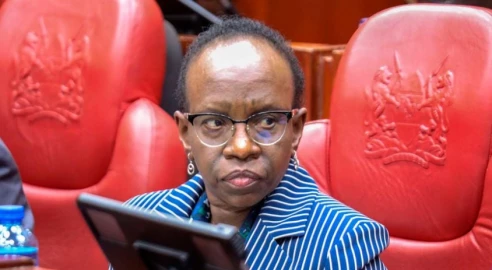- In a special report tabled before the Public Accounts Committee of the National Assembly, Auditor General Nancy Gathungu revealed that the National Government has consistently underfunded public schools.
 Auditor General Nancy Gathungu during a past Parliamentary committee appearance. PHOTO | COURTESY
Auditor General Nancy Gathungu during a past Parliamentary committee appearance. PHOTO | COURTESYThe Auditor General’s office has laid bare the challenges facing the public education sector in the country, with many schools suffocating under debt.
In a special report tabled before the Public Accounts Committee of the National Assembly, Auditor General Nancy Gathungu revealed that the National Government has consistently underfunded public schools.
In an audit conducted between the 2021 and 2024 financial years, it was revealed that the Government underfunded public schools to the tune of Ksh.117 billion, with secondary schools being the most affected.
Speaking before the committee chaired by Tindi Mwale, the Director of Audit in the Auditor General’s office, Justus Okumu, said secondary schools had received Ksh.71 billion less over four years. Junior secondary schools received Ksh.39.9 billion less than the budgeted amount, while primary schools were short by Ksh.14 billion during the period under review.
“The main problem facing public schools is underfunding. The Ministry comes up with a budget for various school activities, but it is always scaled down. As a result, some activities are either shelved or undertaken, leading to the accumulation of pending bills,” he told the committee.
During the audit, the National Education Management Information System (NEMIS) also came under sharp scrutiny for showing inconsistent student numbers compared to actual enrollment in schools. The system was blamed for the underfunding of some schools, while others received more funds than they were entitled to.
According to the audit, 354 secondary schools were overfunded by Ksh.3.5 billion, 99 junior secondary schools were overfunded by Ksh.30.8 billion, and 270 primary schools received an excess of Ksh.79.9 million, totaling Ksh.3.7 billion in overfunding.
Meanwhile, some schools were underfunded, prompting committee members to question the integrity of the NEMIS system.
“The very nature of NEMIS was designed to disenfranchise some regions of the country. That is why, in many cases, the student numbers in NEMIS are half of what actually exists in schools. We hope this historical injustice will be addressed when we consider this report,” said Funyula MP Oundo Mudenyo.
More puzzling were revelations about capitation funds sent to schools that, according to the Auditor General, were non-existent.
Details in the report showed that an audit inspection of 83 sampled schools found that 14 schools received capitation funds totaling Ksh.16.6 billion, yet investigations revealed they did not exist.
“However, the schools did not appear in the County Director of Education’s records, and the CDEs were not aware of their existence,” Okumu told MPs.
The audit also revealed that six of the sampled schools, which had ceased operations, still received capitation amounting to Ksh.889,348. Thirteen schools that received Ksh.11 million during the audit period had registered names that differed from those captured in NEMIS.
“We want to know who authorized the transfer of funds to ghost schools, and we demand to know which heartless public officer pressed the button to send money to them. Action must be taken,” said Funyula MP Mudenyo.
Committee Chairperson Tindi Mwale stated that the Ministry of Education will now be summoned to explain the issues raised in the audit report.
“We shall write to the Ministry and ask them to respond to the discrepancies highlighted in the special report. Special reports are prioritized, and we are going to move swiftly and demand answers from the accounting officer,” he said.
©Citizen Digital, Kenya
 6 days ago
220
6 days ago
220


